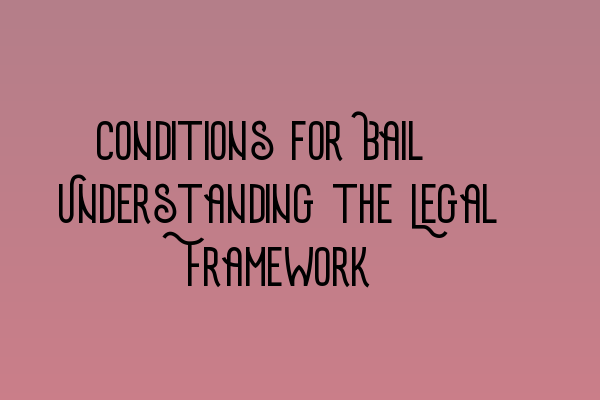Conditions for Bail: Understanding the Legal Framework
Bail is a crucial aspect of the criminal justice system, which allows individuals accused of a crime to be released from custody pending their trial. However, the granting of bail is subject to certain conditions that must be met to ensure the safety of the public and to secure the defendant’s appearance in court. In this article, we will explore the legal framework surrounding the conditions for bail and discuss the factors considered by the courts when deciding on appropriate bail conditions.
The Importance of Bail Conditions
Before delving into the details, it’s essential to understand why bail conditions are necessary. When a person is arrested and charged with a crime, they may be held in custody until their trial. However, this prolonged detention can have severe consequences, including the loss of employment, disruption of personal relationships, and limited access to legal counsel. Therefore, the courts aim to strike a balance between protecting the rights of the accused and ensuring public safety through the imposition of bail conditions.
Factors Considered by the Courts
When deciding on appropriate bail conditions, the courts carefully consider various factors. These factors include but are not limited to:
- The seriousness of the offense: The nature and severity of the alleged crime play a crucial role in determining the conditions for bail. For instance, if the offense involves violence or poses a significant risk to public safety, stricter conditions may be imposed.
- The defendant’s criminal history: Previous convictions or a history of non-compliance with court orders may influence the court’s decision. The court will assess whether the defendant is likely to reoffend or fail to appear in court.
- The defendant’s ties to the community: The court will consider factors such as the defendant’s residence, employment, family ties, and community involvement. These aspects help determine the likelihood of the defendant absconding or failing to meet their bail obligations.
- Risk of interference with witnesses or evidence: If there is a substantial risk that the defendant may interfere with witnesses or evidence, the court may impose strict bail conditions to prevent any potential tampering.
- Flight risk: The likelihood of the defendant fleeing the jurisdiction is carefully evaluated by the court. Factors such as access to passports, financial resources, and connections abroad may influence the court’s decision.
It is worth noting that the above factors are not exhaustive, and the court may consider other relevant circumstances on a case-by-case basis. The court’s ultimate objective is to ensure that the bail conditions imposed are reasonable, necessary, and proportionate given the circumstances of the case.
Common Bail Conditions
While the specific conditions for bail may vary depending on the individual case, some common conditions are often imposed by the court. These may include:
- Restrictions on travel: The court may require the defendant to surrender their passport or impose travel restrictions to limit their ability to leave the jurisdiction.
- Reporting requirements: Defendants may be required to regularly report to a designated law enforcement agency or a bail supervisor.
- Residence restrictions: Defendants may be required to reside at a particular address and obtain court permission for any changes in residence.
- Curfews: The court may impose curfew conditions, prohibiting the defendant from being outside their residence during specified hours.
- Non-contact orders: In cases involving domestic violence or harassment, the court may prohibit the defendant from contacting the alleged victim or other specified individuals.
Breach of Bail Conditions
Failure to comply with bail conditions can have serious consequences, including revocation of bail and a return to custody. It is crucial for defendants to understand their bail conditions fully and seek legal advice if they have concerns or difficulties in meeting these conditions.
If a defendant believes that they cannot comply with their bail conditions for a legitimate reason, they should immediately consult with their solicitor to seek a variation of the conditions or request a new hearing for reconsideration.
Conclusion
Bail conditions serve an essential role in the criminal justice system by ensuring the safety of the public while safeguarding the rights of the accused. The conditions imposed must be reasonable, necessary, and proportionate to the circumstances of the case. By considering factors such as the seriousness of the offense, the defendant’s criminal history, and their ties to the community, the court aims to strike a balance between these competing interests.
To learn more about the SQE Criminal Law & Practice in the UK, check out our related articles:
